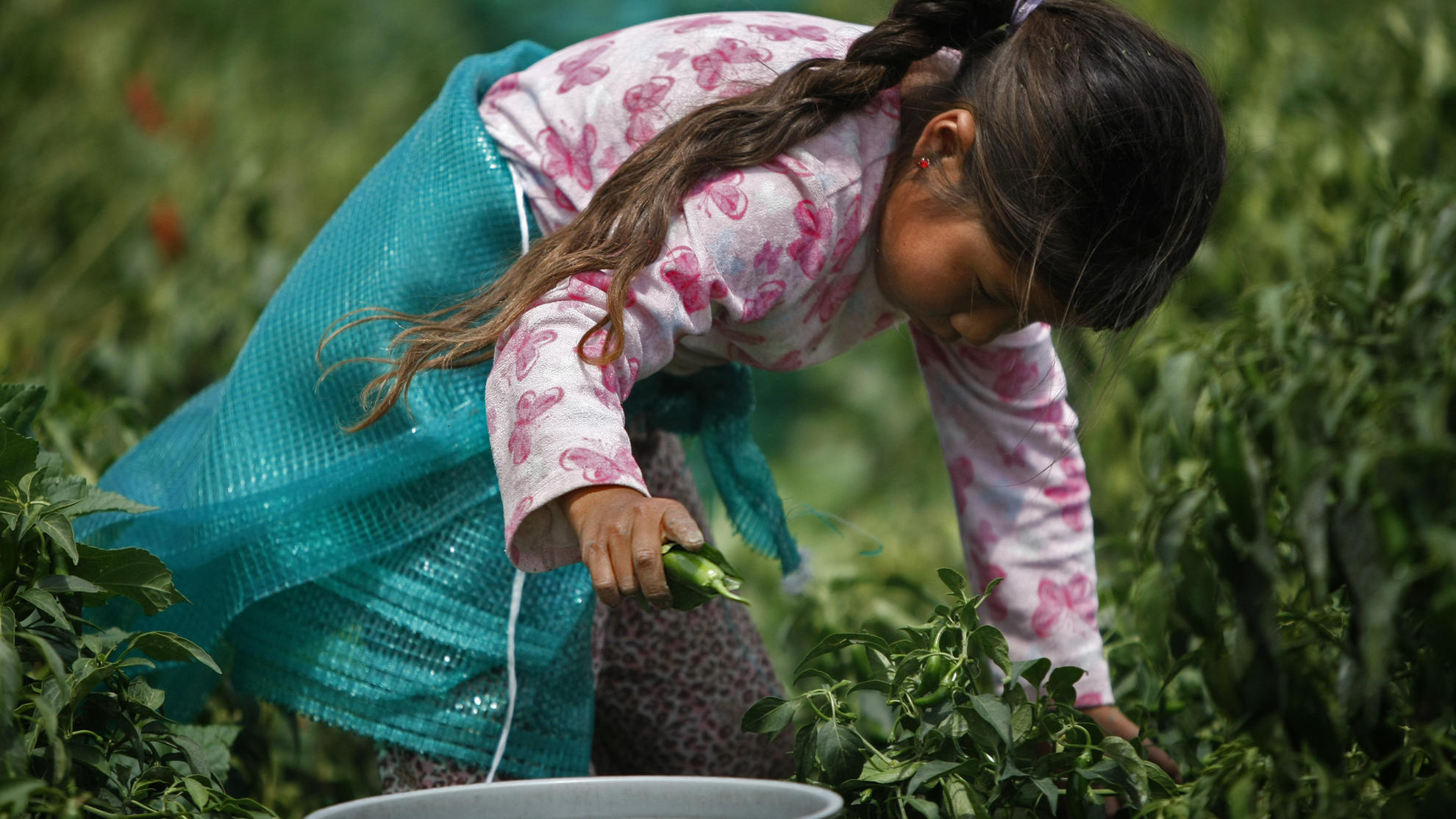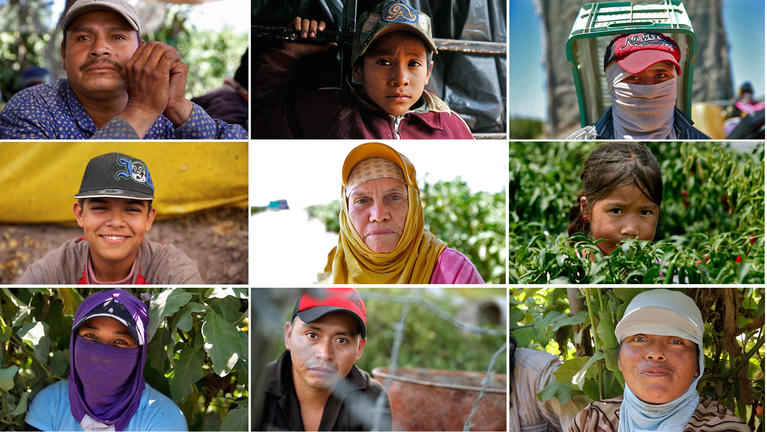Product of Mexico

Scroll to read

Scroll to read
The mom-and-pop monopolies sell to a captive clientele, post no prices and track purchases in dog-eared ledgers. At the end of the harvest, many workers head home owing money.
Third of four stories

Reporting from Campo Isabeles, Mexico
The farmworkers lined up right after work, clutching crumpled pesos. The shelves before them were stacked high with staples: corn flour and beans, diapers and Mexican sweet bread.
Most weren't buying, however.
Dionisia Bustamante handed 1,000 pesos, about $70, to Israel Gastelum, owner of the company store at Campo Isabeles.
She was short 2,000, but it was the best she could do. “We’re running out of vegetables to pick,” she explained.
A wiry man held out 400 pesos. "You still owe 500," Gastelum said.
"How am I going to pay?" the laborer asked. "We're not earning enough."
Other field hands at Campo Isabeles, part of a farm complex near Culiacan in the state of Sinaloa, stayed away from the store so as not to add to their debts.
Catarino Martinez said he had gone without eating that day. Esteban Rodriguez said the storekeeper had threatened to call the police if he didn't pay the 2,000 pesos he owed.

Pedro Castillo feared something worse. "The owners said they will take my son or my daughter if I don't pay my bill," he said.
Gastelum said the threat was made in jest, but Castillo seemed to take it seriously.
Leaning over the counter, the mustachioed Gastelum said the workers' complaints about being broke were exaggerated. "The laborers all go home with money," he said. "These people are great savers."
Marcelino Galvez, sitting on an overturned bucket nearby, disagreed. He said he owed Gastelum 200 pesos and was heading home in a week. "I haven't saved anything," he said.
Company stores, called tiendas de raya, are a stubborn vestige of an oppressive past. During the early 20th century hacienda era, they kept peasants buried in debt, fueling resentment that helped spark the Mexican Revolution.
The country's export farms have modernized rapidly in recent years to meet U.S. food safety standards and satisfy Americans' appetite for fresh fruit and vegetables year-round.
But the company stores operate as they have for generations: as mom-and-pop monopolies that sell to a captive clientele, post no prices and track purchases in dog-eared ledgers.

The tiendas play a key role in a farm labor system that holds workers in a kind of indentured servitude. The combination of low pay and high prices drives many deep in debt to the stores. They spend the picking season trying to catch up. Guards and barbed-wire fences deter workers from fleeing the camps and their unpaid bills.
At the end of the harvest, many head back to their mountain villages owing money to the stores. The debts are waiting for them when they return the next season, and the cycle continues.
"They take your last peso before you get to leave," said Fidel Tapia, a laborer who had traveled to Campo Isabeles from the southern state of Guerrero.
The stores survive because there is no significant pressure on agribusinesses to provide something better for field laborers. To the extent U.S. retailers scrutinize conditions at Mexican farms, the focus is on food safety, not worker welfare.
The social responsibility guidelines of most big companies don't mention company stores.
The laborers who live in Campo Isabeles and shop at Gastelum's store pick crops for Rene Produce, one of Mexico's most lauded agribusinesses.
Rene grows tomatoes, cucumbers, bell peppers and eggplants in greenhouses and open fields south of Culiacan.
The farm shipped 200 million pounds of tomatoes to the U.S. in 2014 and was named one of Mexico's agricultural exporters of the year. Mexican President Enrique Peña Nieto presented the award to company founder Rene Carrillo at a gala ceremony in the resort city of Mazatlan in September.
Wal-Mart, Whole Foods, Target and other U.S. retailers have sold produce from the farm.
Rene operates Campo Isabeles, a collection of run-down, tin-roofed buildings that is home to several hundred laborers. The nearest convenience store is a half-hour walk down a dirt road — too far for most workers after a long day in the fields.

Gastelum's store sits just inside the camp's main gate. It's an independent business that pays rent to Rene, a typical arrangement at Mexican farms.
The snug brick store resembles a stripped-down highway mini-mart. Gastelum and members of his extended family work the counter. Baby formula, deodorant, bath soap and canned goods line the shelves behind them.
Candy hangs in strips from the corrugated metal ceiling. Egg cartons, chips and more candy are stacked on the counter. Five-gallon jugs of water are piled outside.
"All that you desire, may God give you in abundance," says a handwritten sign in Spanish.
No one goes behind the counter except the Gastelums. Customers ask for what they want, and one of the proprietors retrieves it. The biggest sellers are beans, rice, eggs, flour and toilet paper.
Without price tags, it's hard to pin down how much items cost.
Gastelum said he charged 2 pesos each for eggs; three customers said they paid 2 1/2 pesos.
A kilo of beans costs 20 pesos, or about $1.40, according to a Gastelum family member. Customers said they paid 28 to 30 pesos — about $2.
Like many tiendas, this one is a social hub, buzzing with conversation at all hours.
Gastelum's gregarious son Lorenzo plays greeter, tending the chicken on a barbecue grill. "We're here to serve the people," he said. "Whatever they need, we provide."
At many export farms, laborers fall in debt the moment they step off the bus. Most are from Mexico's impoverished indigenous regions. They typically have no money and won't be paid for a week or more. They need immediate credit, and the tiendas oblige.
Farm managers and agricultural engineers can drive to big-box discounters to shop. For laborers, the tienda is usually the only option within miles. Lacking storage space or refrigerators, workers often have to buy one roll of toilet paper, one bar of soap or an egg or two at a time.
After a day in the fields, laborers can be charged half a day's wages for a soft drink and a plate of chicken — and not even know how much was added to their tabs.
Many tiendas don't issue receipts. The unmarked prices vary from store to store, even from customer to customer.
"It depends on how they view someone.… If he can't read or write, the price can be more expensive," said Cresencio Ramirez, director general of the Network of Indigenous People of Sinaloa.
The federal government, sensitive to the fraught history of company stores, operates its own discount outlets in some camps and sends mobile stores to others. Some agribusinesses have formed cooperatives to sell staples to laborers at low prices. But such efforts have been too limited to break the grip of the tiendas.
In business 40 years, Israel Gastelum sticks to tradition. He tallies purchases by hand in a worn account book.
Gastelum said he marks up prices just enough to cover his rent payment to Rene Produce and turn a small profit. He said that he can afford an occasional vacation in Southern California, where he worked at a meat market and in construction years ago, but that he lives modestly.

Gastelum charges 8 pesos for toilet paper, which he sells by the roll. A four-pack costs half as much per roll at a discount store in Culiacan.
He charges 102 pesos, about $7, for a package of 40 diapers — 30 pesos more than the discount store.
Soda and other items were only slightly more expensive than at convenience stores.
For laborers, even small markups sting. After juggling their debts for much of the season, many grow desperate as the end of the harvest approaches and there are fewer tomatoes, peppers and cucumbers left to pick.
Wages drop — from about $14 a day at the beginning of the harvest to $4 — but prices at the tienda don't.
Marta Gastelum, the store owner's daughter-in-law, said workers make do by buying less. The drop-off is noticeable toward the end of every season, she said.
"They need to save to pay the bill," she said. "So people stop eating so much."
Peña Nieto went to Rene Produce in 2013 to kick off a campaign to eliminate hunger and malnutrition across Mexico. Rene seemed a logical place for the presidential announcement, given its success as a high-volume grower.
But when a Times reporter and photographer visited the farm in March, near the end of the 2014 harvest, food was scarce for many of the laborers.
After picking vegetables all day, men scavenged for ears of corn in a nearby field. Others dipped crude fishing lines in an irrigation canal. People filled drinking containers from the canal rather than pay for bottled water.
Catarino Martinez said he was dependent on handouts of cucumbers or peppers from friends. "I'd like to eat a cookie, or a potato chip, but I don't have any money," he said.
Luis Samuel Hernandez, a skinny young man, said a tortilla was all he had eaten that day. The company store had cut off his credit, he said.
Some pickers in Hernandez's position plotted escapes.
"I'm an honest man," he said. "I want to leave through the front gate."
A Rene Produce executive expressed surprise when The Times described the debts and hardships facing workers at the farm.
"We have to listen to what you've said and do something," said Jose Humberto Garcia, the chief operating officer.
He said that Rene had been in contact with the nonprofit Fair Trade USA, which advocates for sustainable farming and equitable treatment of laborers, about ways to enhance workers' welfare.
"We're not the kind of company to find room for improvement and not do anything about it," he said.
Fair Trade USA's standards call for everyday goods to be sold at cost at labor camps. Garcia said Rene would consider such a policy.
Regarding workers' claims that they had been threatened over their debts, he said, "There's no use scaring people.... We'll do something about it."
Garcia said that not all of Rene Produce's laborers struggled financially, and much depended on their ability to manage money. Some of them said they were able to save — mostly crew bosses and young men and women without families.
Whole Foods, which has stocked produce from Rene, said it was looking into the company store and other problems The Times found at Campo Isabeles.
"We're initiating the due diligence process that we follow with suppliers when issues like these are brought to our attention," said Edmund LaMacchia, a global vice president of procurement for Whole Foods. He described Rene as a minor supplier.
Target said it had received "a very small amount of our produce" from Rene earlier this year but was not currently selling any fruit or vegetables from the grower and did not plan to.
A Wal-Mart spokeswoman said Rene "supplies produce for sale at Wal-Mart's U.S. retail operation." The retailer said it put Rene on a "corrective action plan" last year after discovering fire safety deficiencies and other, unspecified problems at its facilities.
Wal-Mart and Target offered no comment on labor conditions at the Mexican farm.

For Luis Hernandez, the night watchman at Campo Isabeles, the end of the 2014 harvest meant heightened vigilance. Whenever he saw someone leaving, he checked with the Gastelums to make sure the laborer had paid his debts, he said.
Some people had to hand over their belongings to settle their accounts. "They have to give up their TVs, fans, anything of value," he said.
Others jumped the barbed-wire fence when he wasn't looking, Hernandez said.
But Israel Gastelum didn't worry much about getting stuck with unpaid bills. Most laborers return for the next harvest, he said, and their jobs, and debts, would be waiting.
"If they don't pay me now," Gastelum said, "there's always next season."
About this series: Los Angeles Times reporter Richard Marosi and photojournalist Don Bartletti traveled across nine Mexican states, observing conditions and interviewing workers at some of the mega-farms that have powered the country's agricultural export boom.
 Video: Behind the Series
Video: Behind the Series
Marosi and Bartletti explain what it took to get access to places that have long escaped outside scrutiny.
Video Credits: Creative Director: Liz O. Baylen. Editors: Spencer Bakalar, Liz O. Baylen, Bethany Mollenkof. Music: Colin Baylen, Nathan Doiev. Executive Producer: Mary Cooney.
Additional Credits: Digital Producers and Developers: Honest Charley Bodkin and Armand Emamdjomeh. Digital Design Director: Stephanie Ferrell.